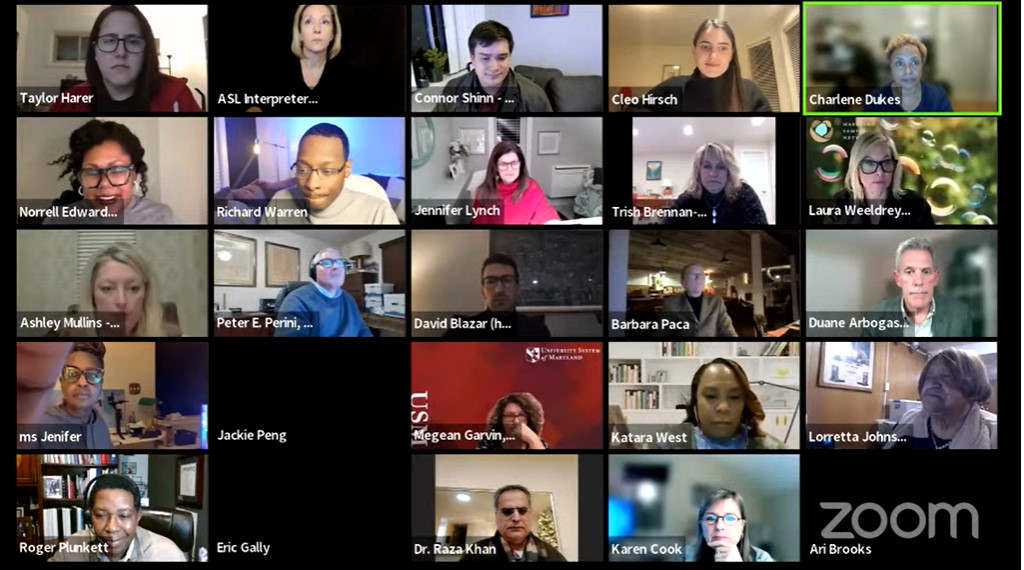Educators, advocates express concerns to Moore transition leaders about recently adopted Blueprint plan

Liz Zogby of Baltimore City said the recently adopted Blueprint for Maryland’s Future education plan doesn’t include support for children with intellectual and cognitive disabilities. Her 12-year-old child has Down Syndrome.
As a co-lead with the Maryland Down Syndrome Advocacy Coalition, Zogby recommends the education transition team for Gov.-elect Wes Moore (D) and Lt. Gov.-elect Aruna Miller (D) produce a policy requiring that general and special education teachers learn “to be able to educate all students.”
William Fields, an attorney and member of the board of trustees for the Maryland School for the Deaf, said representatives who crafted the Blueprint plan “did not talk to state schools. They only talked to county schools.”
“We’re asking, whether it’s by regulation, executive order [or] statute, that we be included [and] that we not be an afterthought,” he said.
Zogby and Fields expressed their education grievances and recommendations at a virtual listening session Tuesday night hosted by the Moore-Miller executive education policy committee. They joined more than 100 people in an online discussion focused on kindergarten through 12th grade.
Participants could enter three other breakout rooms to discuss government leadership, higher education and early childhood education. However, those who viewed the discussion live on YouTube could only listen in the “K-12” room.
The administration’s goal is to hear from educators, advocates, parents and residents to present policy suggestions outlined in three categories: student support, structural and teacher support and career pipelines.
Others talked about the $3.8 billion Blueprint plan adopted last week by the Blueprint for Maryland’s Future Accountability and Implementation Board (AIB). The 10-year plan seeks to reform the state’s education system.
Although Lisa Rubinstein Fuller of Montgomery County said she supported approval of the plan, she said it appears local school officials remain confused on how and when to implement it.
“I just ask the Moore-Miller [administration] to please get involved with the AIB,” she said.
Part of the state law requires the Blueprint board to work with local school officials, the state Department of Education and other local and state agencies on implementing the plan in each of the state’s 24 school districts, also called local education agencies.
The Blueprint board plans to hold a virtual meeting Thursday and then join the state Board of Education for a joint session on the reform plan Friday in Linthicum Heights.
As of Wednesday, an agenda hadn’t been posted for Friday’s meeting on the state website. The meeting is scheduled to start at 9:45 a.m. and end by 2 p.m.
The state Department of Education outlines three Blueprint priorities to complete by June:
- Launch a multiyear strategic plan in three phases to anchor the department’s mission, vision and other initiatives.
- Ensure all school districts receive technical assistance to successfully develop and receive approval on their plans.
- Launch a new Office of Teaching and Learning to develop high-quality teaching and learning in school districts and “early childhood education providers.”
Besides a June deadline for school officials to submit Blueprint plans, the school districts must submit a second set by March 2024 that incorporate the Blueprint four priorities through the 2026-27 academic year.
A third and final submission is due in 2027 to cover the school years between 2027 and 2031-32.
Several people support the overall concept of the Blueprint plan, but offered some criticism of what they say remains missing.
Genie Massey, of Washington County, representing the Maryland Civic Education Coalition, said the Blueprint plan should require the state’s teaching fellows program to incorporate social studies to increase teacher diversity in the classrooms.
One item in the plan Frank Patinella hopes won’t be forgotten deals with cultural competency, which the Blueprint board approved to ensure teachers receive professional development on that subject. The state Department of Education must also define it and develop a framework around cultural competency and equity in the schools.
“We’re trying to make sure that cultural competency isn’t just a half-day professional development training session and a simple checkbox,” said Patinella, senior education advocate for the ACLU of Maryland. “Without a comprehensive and intentional, anti-racist framework that guides practices in the classroom, these schools can be doing more harm to Black and brown children and that goes unnoticed.”
Other education initiatives proposed for the Moore administration to prioritize include additional tutoring services for students, improving special education and incorporating mediation programs for students as opposed to strict discipline such as out-of-school suspension or sending them “to the police.”
Moore’s education committee plans to host another session next month. It wasn’t mentioned whether it will be held before or after the swearing-in ceremony for Moore and Miller on Jan. 18.
“I want to commend you all with your beautiful suggestions and your beautiful brains and minds and all the intellect that was presented,” said Richard H. Warren Jr., professor of Education at the University of Maryland Eastern Shore and co-chair of the committee. “We hear you and we will continue to lay out our plan to try to tackle some of these issues.”




 Creative Commons Attribution
Creative Commons Attribution